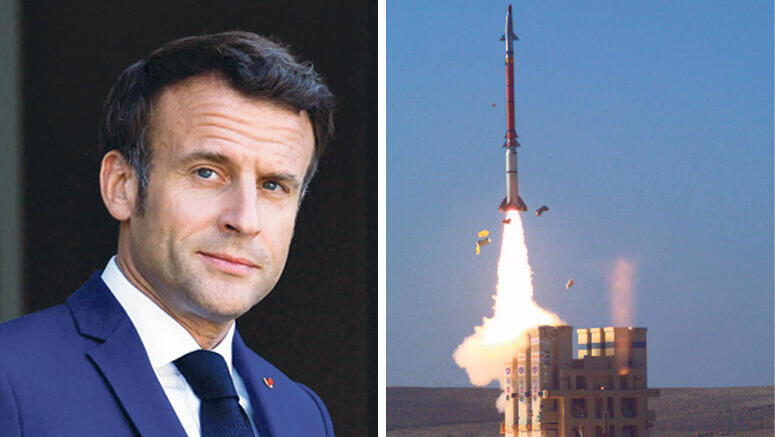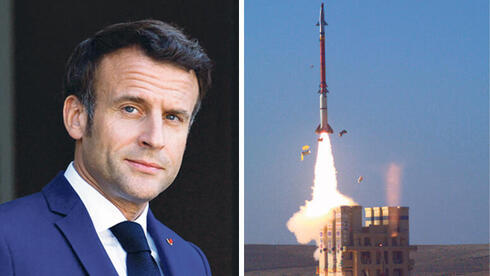
At arm's length: French kick Israel out of arms exhibition - and government is silent
64 Israeli defense firms hoped for government support after being barred from France's Eurosatory arms exhibition, but Israel's leaders have yet to speak out.
On Tuesday, Prime Minister Benjamin Netanyahu and French President Emmanuel Macron spoke on the phone. Since the end of last week, when the initial reports came out about the "decision of the authorities" in France to cancel the participation of 64 Israeli defense companies in the Eurosatory arms exhibition to be held later this month in Paris, senior industry officials have been counting on Netanyahu's intervention in the crisis.
They believed that such a conversation would reverse the "decision of the French authorities" and allow them to participate in the prestigious and respected exhibition and rescue them from humiliation and the treatment given to pariah states. After all, most of the exhibits they wanted to display as part of the exhibition were already sent to France a few weeks ago, from models of the Arrow missiles of the Aerospace Industry to the ATMOS cannon of Elbit Systems.
At the end of the conversation with Macron, Netanyahu's office announced that he informed the French president of the details of the outline for the release of the hostages, and emphasized that it allows Israel to realize all of its goals for the war, including the elimination of Hamas.
Did Netanyahu discuss with Macron the French boycott of the Israeli defense companies that excludes them in an unprecedented manner from the prestigious exhibition? Did the Prime Minister ask the French President to separate politics from business and reverse the decision? Did Netanyahu ask Macron and he answered in the negative? Netanyahu's office does not say.
On the same day as the conversation between the two heads of state, the Ministry of Defense received an official and final French announcement about the cancellation of Israel's participation in Eurosatory. Even the senior officials of the ministry, will remain in Israel, being treated as if they were a country like North Korea, Iran, Russia or Syria.
Defense industry leaders must come to terms with the French's humiliating action. Those who trade in weapons, which are inherently lethal, are not accustomed to coddling. Their chief concern lies in imitators. They fear that other nations, emboldened by France's stance, will follow suit, as Chile did in April, barring Israeli participation in an exhibition addressing Latin America's security needs.
Next month, the Farnborough Exhibition will take place in London. Despite British pro-Palestinian activists' opposition to Israel's actions in Gaza, there are no indications of a similar boycott. One of the key benefits of participating in international arms exhibitions is access to procurement and planning officials from various countries and militaries, fostering a flurry of business meetings that can lead to substantial deals.
In the wake of their exclusion from Paris, Israeli industry representatives are endeavoring to conduct these crucial meetings at the ILA exhibition in Berlin, currently underway, and next month in London.
Related articles:
Senior security officials assert that despite France's harsh measures, driven by the conflict and its extension to Rafah, Israeli weaponry remains highly sought after in a world increasingly arming itself. They denounce France's actions as hypocritical.
Several years ago, when France sought a system to safeguard former President Nicolas Sarkozy's aircraft from shoulder-fired missiles, they turned to Israel. Yet now, the same company they relied on faces boycotts and disgrace on the world stage.
Before Israeli defense industry leaders decry France's stance, they must first address matters at home. Apart from the Prime Minister's Office's silence on the boycott, the Ministry of Defense has made no official statement. The Ministry of Foreign Affairs has also remained silent, treating the crisis affecting Israeli firms as if it were a non-issue.
Two weeks ago, Foreign Minister Israel Katz met with French Foreign Minister Stéphane Séjourné in Paris. Yet, the subsequent report failed to mention the Eurosatory crisis or the status of Israeli defense companies globally, despite Israel's leaders boasting of their burgeoning order books less than a year ago in response to a pessimistic Moody's report.
Last week, Netanyahu was interviewed in French on the TF1 channel, touting Israel's triumph in Gaza for the sake of European peace. Some speculate that Netanyahu's decision to address the French people directly, bypassing Macron, was the final blow to Israeli participation in Eurosatory. Indeed, reports surfaced in France the next day announcing the cancellation of defense industry delegations.
The winds of Paris have been blowing against Israeli firms since last March. Calcalist previously reported that the French Ministry of Defense imposes unusual obstacles on companies seeking to participate in Eurosatory, requiring them to obtain special licenses.
MK Sharon Nir (Israel Beitenu) and a third of her colleagues petitioned the Knesset's Foreign Affairs and Security Committee, chaired by Yuli Edelstein (Likud), to discuss the issue. Nearly three months have elapsed with no such discussion. This week, following France's actions, Nir reached out to Edelstein again, hoping for a change of heart.
"France's decision is unprecedented and directly impacts the status of Israeli defense industries worldwide," Nir wrote to Edelstein. "Israel and its companies cannot afford to have their standing diminished, and this matter must be addressed immediately."
Whether the Foreign and Security Committee convenes on the French boycott or not, it may already be too late. Israeli industry officials do not discount the possibility that France is capitalizing on the Gaza conflict to undermine Israeli competitors, as major rivals vie for lucrative arms contracts worldwide.
A year ago, as Israel and Germany negotiated a significant Arrow 3 defense missile deal worth over NIS 14 billion ($4M), Macron voiced opposition. The system, slated for delivery to Germany next year, aims to shield Europe from ballistic missiles amid Russia's conflict in Ukraine.
During discussions with European defense ministers and NATO heads, Macron criticized Germany's deal with Israel, advocating for European adoption of the SAMPT defense system from French-Italian company MBDA. He reiterated this sentiment at the Paris Air Show weeks later.
However, German Chancellor Olaf Scholz remained unperturbed by Macron's objections, and the Arrow deal proceeded as planned. Israel Aerospace Industries (IAI), tasked with developing and manufacturing the defense missiles, ramped up production to meet Germany's tight deadlines.
It's no wonder that aerospace industry leaders, including chairman Amir Peretz, strode through the ILA exhibition in Berlin this week with the air of grooms on their wedding day.
